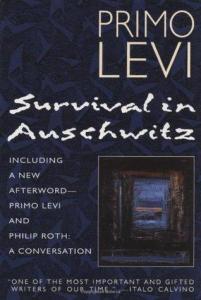I read Night and The Diary of a Young Girl very close to each other a few years back and it got me to add this book to my list as well. I received it as a Christmas gift a few years ago but it lingered on my shelf for a while. A trip to Las Vegas seemed like as good a time as any to dive into it.
Survival in Auschwitz by Primo Levi
Summary from Goodreads:
In 1943, Primo Levi, a twenty-five-year-old chemist and “Italian citizen of Jewish race,” was arrested by Italian fascists and deported from his native Turin to Auschwitz. Survival in Auschwitz is Levi’s classic account of his ten months in the German death camp, a harrowing story of systematic cruelty and miraculous endurance. Remarkable for its simplicity, restraint, compassion, and even wit, Survival in Auschwitz remains a lasting testament to the indestructibility of the human spirit.
This is a survival story, no question about it. Levi focuses on how he lived in the camp and how he survived when so many around him didn’t make it. He talks about the right amount of work to do, the good jobs to get, the ways to pass examinations. He details how the trading system worked and what tools were essential and how to get them, how to make them. It felt like a survival story more than a Holocaust story to me. The Nazi officers were not consistent characters but Levi’s bunk-mates and trading partners were.
Levi painted vivid pictures of other prisoners. He gave us details about ones who were like him, ones that were unlucky, and ones that couldn’t survive. I felt he pained a vivid picture of himself, too. For me, the most impactful part was when he detailed the other men in the quarantined room with him before liberation. The teamwork they demonstrated was incredible. Finally, it was about the survivability of the group and not the individual and that really shone through.
Levi was the only major character in the story and I liked how he portrayed himself. He was smart and was able to use that intelligence to get him a good position. But a good position didn’t mean comfort, it meant more opportunities. He stole and traded and schemed to get more food. He used that job to survive and to help his friend survive. There was no enduring, you had to find a way to make things better for yourself.
It was hard to relate to Levi and the characters in the story because his story is so extreme. I think that’s why it’s important. It’s important to remember that humans did this to other humans because they thought some were less than others. It highlights what happens to us when we do this to each other and why we can never let this happen again. It’s the un-relatability of his story that’s so important.
The final scenes in the infirmary spoke to me most. In history, I’d heard that those who were ill were left behind and liberated soon after. The days-long delay and the horror it brought was never mentioned before. The number of men who died waiting for freedom astounded me and I was so sad to hear about them.
The book was non-chronological and that confused me at times. I would question what job Levi was doing or how long he had been in the camp when something happened and I’d be confused for a few pages before I found a landmark. I understand that this book was not written in chronological order on purpose; it’s written to detail the different steps taken to survive. It’s a small gripe, but it’s really the biggest one I have.
We should not have to survive the treatment of other humans. Abused women and children, prisoners, and Holocaust victims have survived things that no person should have to. We have the ability to take away the freedom of others. But we shouldn’t. We shouldn’t have to be ‘survived’ by others in the way Levi had to survive.
Writer’s Takeaway: Levi told a story with impact. He didn’t sugar-coat anything or leave out any detail that might be embarrassing. His candid telling is why this is so powerful and wonderful and scary and tragic. I think memoir should always be like this. Otherwise, we might not learn something essential.
The book was impactful, though I did find myself confused and tuning out at times because of the time jumps. Four out of Five Stars.
Until next time, write on.
You can follow me on Goodreads, Facebook, Twitter, Pinterest, and Instagram. I’m available via email at SamAStevensWriter@gmail.com. And as always, feel free to leave a comment!
Related Posts:
Primo Levi Blog- Survival in Auschwitz through a Christian Perspective
Primo Levi’s reflection on humanity in crisis: Survival in Auschwitz (If This is a man) | Literaturesalon’s Blog
An Encapsulating Analysis of Primo Levi’s Survival in Auschwitz | Vivid Incandescence
Survival in Auschwitz | Posthegemony



